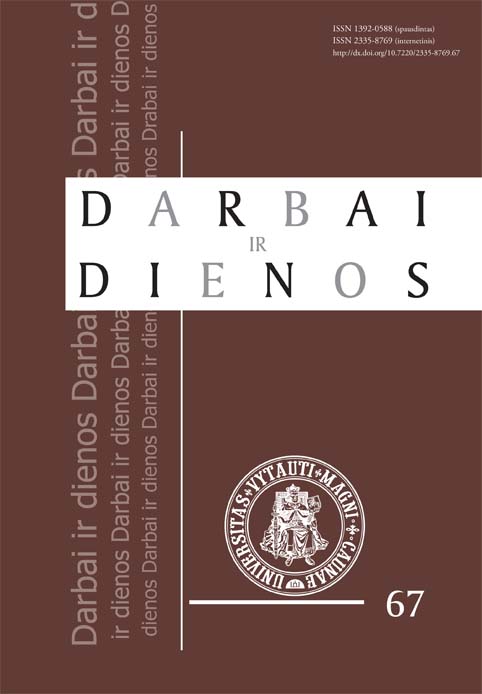Leonidas Donskis: nuo faustiškųjų morfologijų iki takiojo blogio kritikos
Leonidas Donskis: From Faustian Morphologies to Criticisms of Liquid
Author(s): Gintautas MažeikisSubject(s): Philosophy, Ethics / Practical Philosophy, Social Philosophy, Philosophy of Mind, Sociology of Culture
Published by: Vytauto Didžiojo Universitetas
Keywords: Leonidas Donskis: From Faustian Morphologies to Criticisms of Liquid;
Summary/Abstract: This paper analyzes the philosophical thoughts of Leonidas Donskis about the evolution of figures of evil in Central and Eastern Europe. The analysis is based on a reading of his theories of the morphology of culture, of the genealogy of ideas, and of the moral imagination. This subject is an integral part of Donskis’s whole intellectual biography, is central to his later researches, and thus partly characterizes all of his investigations. In this paper, after briefly surveying the assumptions of Oswald Spengler’s analysis as well as Donskis’s ideas of Renaissance titans and Enlightenment geniuses, I turn to his analysis of the moral imagination, its features, development, and main conceptions. Donskis discusses problems of the moral imagination on the levels of (1) Central and Eastern European social and political critique and of (2) the analysis of dystopias. The main figures of evil discussed are those of the true believers, the ideological doctrinaires, and the fundamentalists. At first Donskis delved into these topics basing himself on the ideas of Vytautas Kavolis and Aleksandras Shtromas. Differences in views about political leftness (revisionism vs. state nomenklatura socialism) served Donskis in developing his own views on the Soviet heritage and on being a true believer. Here the figures of kanukai (Ričardas Gavelis), murti-bingo (S. I. Witkiewicz), and ketman (A. de Gobineau and Czesław Miłosz) come into play, as well as the dystopias of Yevgeny Zamyatin, George Orwell, and Aldous Huxley. I pay special attention to Donskis’s expansion of Michel Houellebecq’s dystopia The Possibility of an Island and his picture of the sensitive cynic. The critique of liberal society implicit in Houellebecq’s work provided an additional stimulus and opportunity for Donskis to reflect, together with Zygmunt Bauman, on the problem of the Global Anonymous, adiaphorization, and liquid evil in our contemporary society of alienated consumers. My article ends with a critique of intellectual apocalyptics, including those in Lithuania, who are opposed to Donskis’s picture of a Europe of intellectual and moral giants and geniuses.
Journal: Darbai ir dienos
- Issue Year: 2017
- Issue No: 67
- Page Range: 11-29
- Page Count: 19
- Language: Lithuanian

